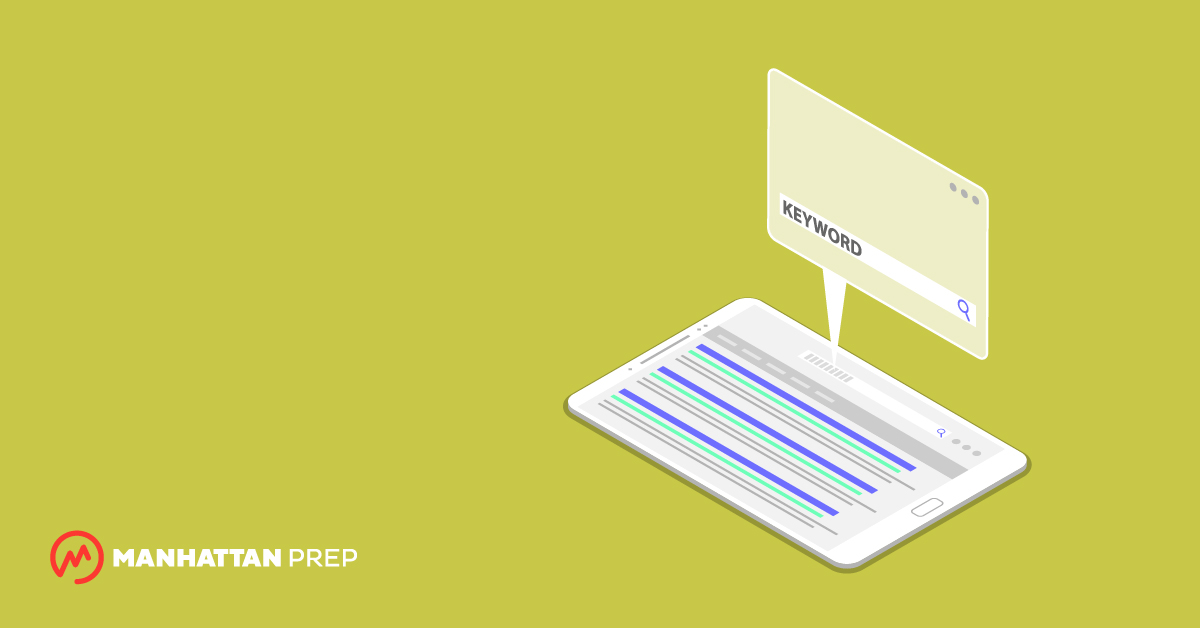The GRE is Changing—What You Need to Know

This post was written by GRE Instructor Tyler Johnson. Big news in the GRE world as ETS announces the first format changes since 2011! Details are still being released; we’ll update this post whenever new information becomes available.
Your GRE Study Calendar

Studying for the GRE on your own? Load up your GRE study calendar right now—it’s time to get organized. Read more
Most Common GRE Vocabulary Words

The most common GRE vocabulary words are rare but reasonable. The vocab questions don’t test the simplest GRE Vocabulary words, like cat or go. They also don’t test the hardest GRE Vocabulary words, like conodont or acnestis. The words tested on the GRE fall between these two extremes. They aren’t words that you see every day, but you’ll eventually run into them if you read plenty of high-quality writing—which is one thing the GRE is testing for! Read more
GRE Work Problems

You can attend the first session of any of our online or in-person GRE courses absolutely free. Ready to take the plunge? Check out our upcoming courses here.
Problems involving work and rates can be a problem for many test-takers, but with a clear method to set them up and a little clever plugging in, you can learn to knock them out efficiently and accurately. Read more
How to Maximize Your Vocab Prep

What are the best ways to study vocabulary on the GRE? I’ve compiled my top strategies for getting the most out of your GRE Vocab prep.
Also, be sure to check out our GRE Word of the Day Vocab Series on YouTube!
What Are the Hardest GRE Math Problems?

And what do they tell us about prepping for the GRE?
Students often ask me, “Where can I find the most difficult questions on the GRE?” In this blog entry, I’ll show you the top three hardest GRE Math problems, ranked by percent of students who got them wrong. Before we get there, I should say: you don’t need to correctly answer questions like these to get a very, very good score on the GRE. This is a test that favors accuracy and consistency on mid-range questions over the ability to get the very hard ones. One can nab a score in the 90th percentile or above without getting any of the very hardest GRE Math problems correct. In case you’re curious, though, this is what the hardest GRE Math problems look like. Each of these questions were correctly answered by fewer than 20 percent of GRE test takers.
Start the drum roll.
How To Take a GRE Practice Test

Regularly taking GRE practice tests (but not too many!) is how you find out whether your studying is working and what to focus on next. But in order to take a practice test perfectly, you need a bit of…practice.
How to Study: Reviewing a GRE Practice Test

You can attend the first session of any of our online or in-person GRE courses absolutely free. Crazy, right? Check out our upcoming courses here.
You’ve been studying for the GRE for a while now, and you’ve taken at least two GRE practice tests. (If not, start with this article instead!) Last time, we started discussing how to review a GRE practice test at a high level. This time, we’ll go even further: you can learn something from every single question on your GRE practice test. Here’s how. Read more
Why A Review Log is Vital to Your GRE Prep
 Like many folks these days, I’m catching up on some TV shows, but I’m still teaching too. For anyone out there studying for the GMAT, LSAT, or GRE, there’s a valuable lesson that I want to share with you that I learned recently from, of all places, a TV show. It’s about the danger of failing to review your work, and the associated importance of keeping a detailed review log. That show is called “Masterchef,” hosted by celebrity chef Gordon Ramsay.
Like many folks these days, I’m catching up on some TV shows, but I’m still teaching too. For anyone out there studying for the GMAT, LSAT, or GRE, there’s a valuable lesson that I want to share with you that I learned recently from, of all places, a TV show. It’s about the danger of failing to review your work, and the associated importance of keeping a detailed review log. That show is called “Masterchef,” hosted by celebrity chef Gordon Ramsay.
How Much Can You Expect Your GRE Score to Go Up with Studying?

As a GRE instructor, I get this question a lot. I’ll start by just sharing what I see, and note that this is just my experience: most students go up 5-8 points with study. That said, there are also students who go up 15 points, so I don’t mean the 5-8 to be read as a cap or threshold.
Now that that’s out of the way, I’ll state the obvious, which is that every person is different. So many factors play into this question, including where you start, how much you study, and how you study. But since you already know that, I want to unpack each of these in order to answer the question more specifically to you.